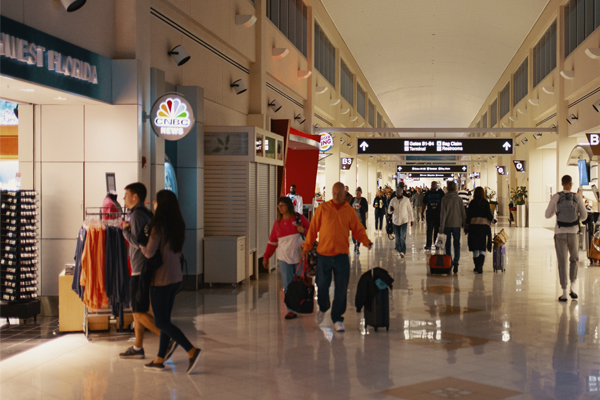Despite a turbulent year as a result of the pandemic, some diversity and inclusion (D&I) progress has been made in the hospitality, travel and leisure (HTL) sector, confirmed a new report.
Encouragingly, the sector has steadily progressed on female and ethnic minority representation over the last three years, noted the Inclusion at the core of recovery: The WiHTL 2021 Annual Report, published in partnership with The MBS Group. The number of HTL businesses in the study with a D&I strategy in place has also increased since 2020 from 80% to 86%.
ENCOURAGING PROGRESS
In the area of gender diversity, there is now 29.8% female representation at Board level; up from 28.9% in 2020, compared to 36.2% across the FTSE 100. Female representation on executive committees has increased to 31.4%, up from 27.2% in 2020. In fact, there is a greater proportion of women at direct report and executive committee level in the HTL sector; compared to FTSE 100 and FTSE 250 businesses, noted the report.
In the area of ethnic diversity:
- There is 4% ethnic minority representation on executive committees, up from 3.4% in 2020.
- 70% of businesses either collect ethnicity data (37%) or are in the process of doing so (33%); up from 56% in 2020.
- Promisingly, and largely due to the impact of the Black Lives Matter movement, significant progress has been made on the number and maturity of strategies designed to improve ethnic diversity. Around 87% of organisations have strategies dedicated to ethnic diversity. In 2020 only 24% of businesses had D&I policies which included ethnic diversity.
ROOM FOR IMPROVEMENT
That said, there’s “considerable room for improvement”, noted the report. Covid-19 has slowed progress on D&I in HTL. Worryingly, as noted in last summer’s report, Covid-19 has had a negative impact on diversity in the industry. Women and ethnic minority colleagues were disproportionately furloughed at all levels. External hiring freezes blocked companies from welcoming leaders from underrepresented groups, and businesses lost vital role models.
Representation of both women and ethnic minorities is down on last year at direct reports level (the most populous level). For example, in the area of gender diversity:
- Female representation at direct report level stands at 34.5%; down from 37.7% in 2020.
- At executive committee level, gender diversity has fallen from just 10% to 7% since 2019; while the number of companies with no women on their Boards has increased this year from 15% to 21%.
GENDER DIVERSITY
That said, despite an extremely challenging year for the HTL sector, female representation has increased at Board and executive committee level. However, the proportion of women at direct reports level is lower than it was last year. This shrinking pool of available talent from which to draw Board and executive committee roles, however, could have a long-term impact on gender diversity in the sector if not addressed, highlighted the report.
According to Denise Wilson, CEO of Hampton-Alexander Review, “we have never had a stronger supply of capable, experienced women in the workforce than we have today”. “The pipeline of talent is full to overflowing, but we’re just not using it in the way we should be. Generally speaking, there’s a lack of knowledge in our leadership around the value of diversity, and the benefits that it can bring to a senior team,” she explained.

RACE & ETHNICITY PROGRESS
Similarly, a step change is needed in the area of race and ethnicity, in the industry. Somewhat disappointingly, the report found the HTL sector has:
- Just 6% ethnic minority representation at Board level; compared to 9.7% in FTSE 100 companies according to the 2020 Parker Review. That’s down from 6.4% in 2020.
- Only 4.7% ethnic minority representation at direct report level, down from 4.8% in 2020.
- Three quarters to four fifths of executive committees still have no underrepresented minorities at these most senior levels. Meanwhile, almost half of companies have no racial or ethnic diversity for direct reports.
- While steady improvement has been made over the last three years regarding ethnic diversity; “representation is still far from reflecting the general population”. And the pace of acceleration must be increased, noted the report.
MORE MEANINGFUL D&I DISCUSSIONS
“This year’s report highlights the phenomenal commitment demonstrated by leaders in the hospitality, travel and leisure industry to continue to make diversity and inclusion a key priority despite the existential challenges brought about by the pandemic,” commented Tea Colaianni, Founder & Chair of WiHTL. “Although it’s clear more work needs to be done, by providing a benchmark for leaders to measure their own company’s progress, as well as offering examples of best practice, this report will act as a catalyst for lasting change in the sector.”

The discussions have become more meaningful, “moving beyond tokenism to how we can execute real improvement,” according to Debbie Hewitt, Chair of The Restaurant Group. “We should really celebrate the fact that we’ve got a yardstick showing where we are and where we need to get to.”
SUSTAINED ACTION NEEDED
“Our latest research shows that the hospitality, travel and leisure sectors have made sustained progress over the past three years in driving the diversity agenda,” stated Elliott Goldstein, Partner of The MBS Group. “However, there is a long way to go. Our leadership continues to be significantly unrepresentative of the UK population in terms of gender, race, ethnicity, LGBTQ+, disability and social mobility. Coming out of the trauma of Covid-19, we are now in a position that companies can build back with inclusion at the core of the recovery. Excitingly, we can see a number of companies who are poised to take advantage of this opportunity.”
Andrew Ninian, Director Corporate Governance at The Investment Association, agreed: “It’s great to see the progress made so far in the hospitality industry, especially given the challenges of the last year.” However he also “believes more needs to be done – in all industries; to ensure greater ethnic and gender diversity in senior leadership teams”. “There are no quick fixes; and while a great deal is being done already, more sustained action is necessary from all of us. The evidence is clear there is a strong business case for companies to have more diverse leadership teams,” he added.
TIME TO DO THE RIGHT THING
“It’s an amplifying effect – if we’re all focused on it [D&I], the industry will move faster,” added Keith Barr, CEO of IHG Hotels & Resorts; and WiHTL Advisory Board member. “Without that committed solidarity, the sector as a whole won’t be attractive to the great diverse talent we need. We all have parts of the solution, but we need to openly share with each other to keep that momentum.”

“If we focus our resources on getting women into those top roles, the gender pay gap will close itself. There’s a bigger gap when it comes to ethnic diversity; but now more than ever society is watching and waiting for us to do the right thing,” he concluded.
Click here to download a copy of the report. Check out last year’s report coverage here.







































